Packaging used for Barbie, Legos, and other toys linked to destruction of Indonesia’s rainforests
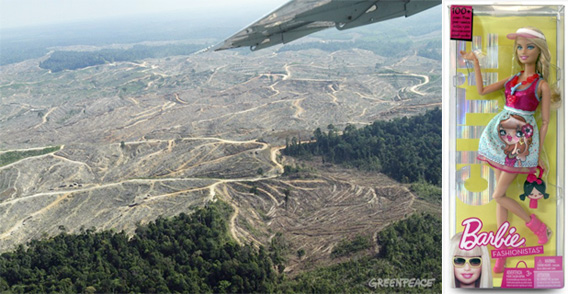
Forest clearing in the Bukit Tigapuluh Forest Landscape in central Sumatra.
Some of the world’s largest and most prominent toy-makers are sourcing their packaging materials from companies linked to large-scale destruction of Indonesia’s rainforests, alleges a new report from Greenpeace.
The report, How APP is Toying with Extinction [PDF], is based on forensic analysis of toy packaging from Mattel, which manufacturers Barbie and Hot Wheels toys; Disney, which makes a variety of toys linked to its movies; Hasbro, which produces GI Joe, Star Wars, and Sesame Street toys and various games like Monopoly and Scrabble; and Lego, which makes the iconic plastic building blocks. The analysis found traces of mixed-tropical hardwood (MTH) and acacia fiber which are principally sourced from Asia Pulp & Paper (APP), an umbrella paper products brand that sources from several companies that have been linked to rainforest destruction in Sumatra. Despite widespread criticism from green groups and defections of major customers, APP continues to source from rainforests that are home to critically-endangered Sumatran tigers and elephants. According to WWF-Indonesia, APP’s subsidiaries control hundreds of thousands of hectares of rainforests in Riau and Jambi provinces in Sumatra. The concessions include extensive areas of carbon-dense peatlands, which when converted to plantations, release large amounts of carbon dioxide.
To publicize the report, Greenpeace activists, dressed in tuxedos to depict Barbie’s boyfriend Ken, climbed Mattel’s Los Angeles headquarters with a giant banner stating: “Barbie: It’s Over. I Don’t Date Girls That Are Into Deforestation.”
Mattel expressed disappointment over the action.
“Over the past months we have been in communication with Greenpeace on a variety of paper-sourcing issues,” Mattel said via a statement emailed to mongabay.com. “We are surprised and disappointed that they have taken this inflammatory approach, considering the open channels of communications we’ve established. We will continue to assess our paper sourcing and packaging improvements as we move forward.”
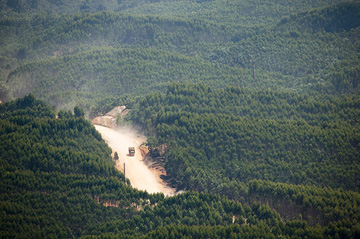 A truck loaded with logs drives on a road in the middle of a Eucalyptus plantation. © Greenpeace / Daniel Beltra 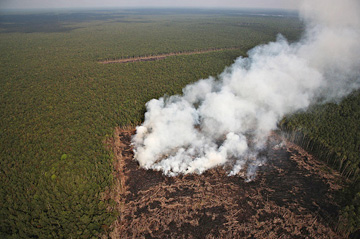 Smoke from man made forest fires in the RAPP concession — a subsidiary of APRIL, another large pulp and paper producer in Indonesia — in Giam Siak Kecil area to clear land for palm oil plantations. © Greenpeace / John Novis. |
Neither Disney nor Hasbro immediately return mongabay.com’s request for comment.
Greenpeace’s action comes just weeks after activists from the Rainforest Action Network (RAN) targeted Disney over its paper-sourcing policies for children’s books. RAN said forensic analysis showed Disney was buying from APP.
Greenpeace said it started with toys because the sector is “a highly visible example of consumer brands that use a lot of glossy packaging.” It notes that other industries also buy from APP.
“Key sectors for packaging include food, drinks, pharmaceuticals, home and personal care products and electrical goods,” states the report. “APP presents a brand risk to companies within these sectors, linking them through their paper and packaging supply chains to the destruction of Indonesia’s rainforests.”
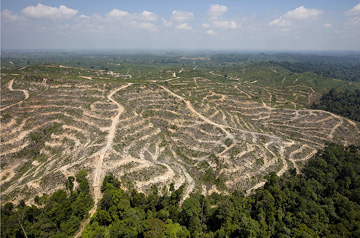 A network of tracks in a huge deforested area among pristine forest. © Greenpeace / Daniel Beltra 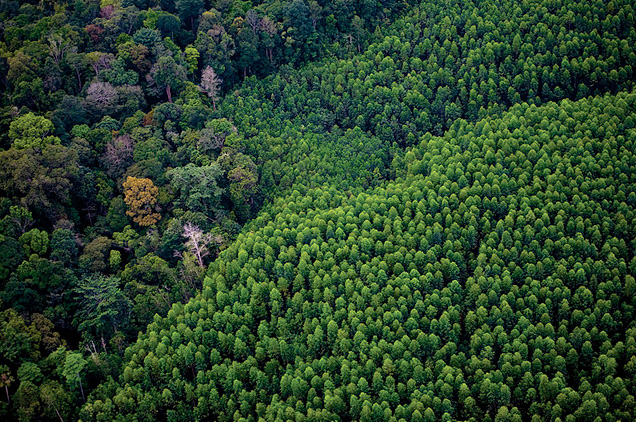 Eucalyptus plantations east of Pekanbaru. © Greenpeace / Daniel Beltra |
“Unlike some progressive companies such as Unilever or Nestlé, top players in the toy sector seem oblivious to the risk to their brands through links to deforestation.”
According to Greenpeace, over half APP’s paper and packaging is produced in China, where it has mills. APP uses virgin fiber for high-quality packaging materials that are typically used for toys. In 2009 imported wood made up two-thirds of the fiber needed by APP China for pulp production.
In recent years APP has also expanded operations in Canada. Its affiliate, Paper Excellence, which like APP is also controlled by the Sinar Mas group of companies, has bought up seven mills in the past year in Canada and Europe.
Through expansion overseas, APP and Sinar Mas may hope to escape sanctions levied on it by the U.S. Department of Commerce, according to one analyst, who requested anonymity. APP has recently stepped up an aggressive public relations campaign to counter criticism over its environmental practices. It has released a number of sustainably reports and regularly runs full-page advertisements in publications like The Economist and The New York Times touting its environmental record. It has also contributed money some conservation projects in Sumatra, including a tiger “conservation” initiative, the Indonesian government’s effort to protect the Javan rhino, and two reserves: Giam Kecil-Bukit Batu Reserve and the Bukit Tigapuluh. But these initiatives have received a tepid response from scientists, conservationists, and environmentalists, who note that APP still intends to destroy far more forest than it claims to help protect.
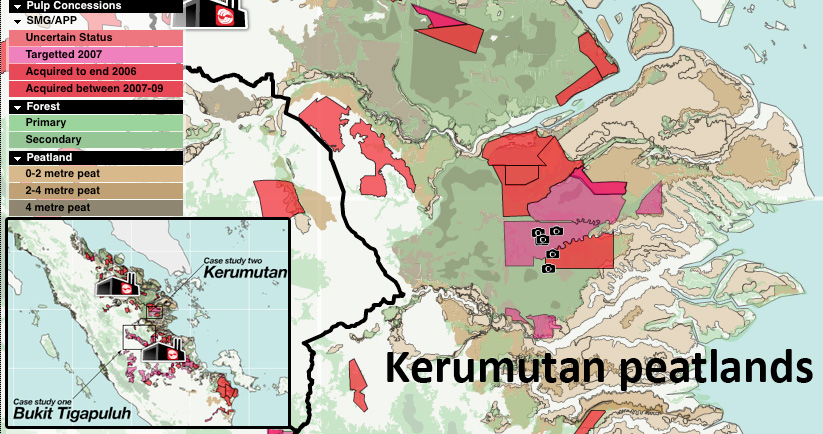
The 1.3 million hectare Kerumutan Peat Swamp Forest.
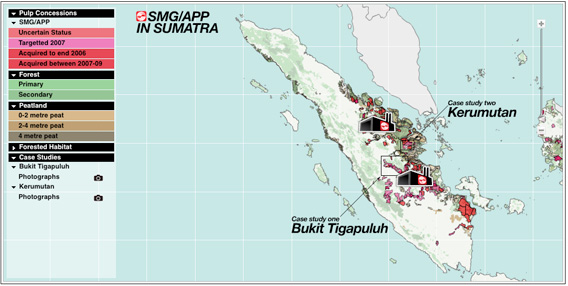
Click image to view map.
Advised by public relations firms like Cohn & Wolfe and Clark & Weinstock, APP has also employed more questionable methods, including supporting groups like World Growth International and the Tea Party-affiliated Consumer Alliance for Global Prosperity which have launched public attacks on companies that have dropped its products (Staples, Office Max, Office Depot) and environmental organizations that have raised concerns about its environmental conduct. These groups are now working to undermine the Lacey Act, the law that prohibits the import of timber and paper products sourced via illegal logging.
While APP subsidiaries have acquired concessions from the Ministry of Forestry in Indonesia, Greenpeace alleges that APP has illegally cleared peatlands in Sumatra. Furthermore three APP affiliates — PT Wirakarya Sakti, PT Rimba Hutani Mas, and PT Tebo Multi Agro — were named by the state audit agency as delinquent in paying timber royalties or fines to the Jambi forestry service.
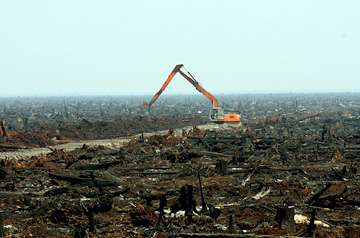 Devastated rainforest and peatlands in Riau, Sumatra. © Greenpeace / Oka Budhi
|
In its report Greenpeace calls on toy-makers to dissociate themselves with illegal logging and destruction of Indonesia’s rainforests and peatlands by implementing strong sourcing policies that would exclude fiber produced by APP until it cleans up its operations. Greenpeace notes that Golden Agri Resources, the palm oil division of Sinar Mas, has already moved to eliminate deforestation from its supply chain, while APP “remains stuck in a deforestation-dependent economic growth
model.”
Greenpeace says Western companies can help support Indonesia’s shift to a low-carbon development pathway — a goal set by Indonesian President Susilo Bambang Yudhoyono — through their procurement policies.
“Corporate consumers can drive low-carbon development by implementing policies to clean up their production and supply chains,” states the report. “This rewards responsible producers, by not unfairly subsidizing environmentally irresponsible companies.”
Greenpeace says that with the right market signals, Sinar Mas could be transformed.
“The Sinar Mas Group – Indonesia’s leading player in both the pulp and palm oil sectors – could drive low-carbon development by establishing industry best practice standards.”
Related articles

(05/14/2011) A new animation created using Google Earth offers a tour of an area of forest slated for destruction by logging companies. The animation, created by WWF-Indonesia and David Tryse, with technical assistance from Google Earth Outreach, highlights the rainforest of the Bukit Tigapuluh landscape in Sumatra, the only island in the world that is home to Sumatran tigers, elephants, rhinos, and orangutans. All of these species are considered endangered or critically endangered due to habitat destruction or poaching.
7 conglomerates control 9M ha of land in Indonesia
(05/05/2011) Efforts to slow deforestation in Indonesia should include curtailing further expansion of forestry holdings by giant conglomerates, says an Indonesian activist group. Analyzing data from the Ministry of Forest’s Production Forest Utilization Quarterly Report, Jakarta-based Greenomics-Indonesia found that seven conglomerates in Indonesia control more than 9 million hectares of land, including large forest concessions that will likely be exempt from any moratorium on forest clearing established under the country’s Reducing Emissions from Deforestation and Degradation (REDD) program. The extent of holdings could complicate Indonesia’s efforts to reduce emissions from logging and plantation development.
Controversial logging company seeks to raise $450 million in China
(03/21/2011) Asia Pulp & Paper (China) Investment aims to raise up to 3 billion renminbi ($457 million) through a bond issue, reports IFR Asia.
Pulp and paper firms urged to save 1.2M ha of forest slated for clearing in Indonesia
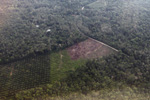
(03/17/2011) Indonesian environmental groups launched a urgent plea urging the country’s two largest pulp and paper companies not to clear 800,000 hectares of forest and peatland in their concessions in Sumatra. Eyes on the Forest, a coalition of Indonesian NGOs, released maps showing that Asia Pulp and Paper (APP) and Asia Pacific Resources International Limited (APRIL) control blocks of land representing 31 percent of the remaining forest in the province of Riau, one of Sumatra’s most forested provinces. Much of the forest lies on deep peat, which releases large of amount of carbon when drained and cleared for timber plantations.
Does chopping down rainforests for pulp and paper help alleviate poverty in Indonesia?

(01/13/2011) Over the past several years, Asia Pulp & Paper has engaged in a marketing campaign to represent its operations in Sumatra as socially and environmentally sustainable. APP and its agents maintain that industrial pulp and paper production — as practiced in Sumatra — does not result in deforestation, is carbon neutral, helps protect wildlife, and alleviates poverty. While a series of analyses and reports have shown most of these assertions to be false, the final claim has largely not been contested. But is conversion of lowland rainforests for pulp and paper really in Indonesia’s best economic interest?
Will Indonesia’s big REDD rainforest deal work?
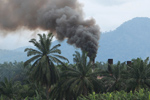
(12/28/2010) Flying in a plane over the Indonesian half of the island of New Guinea, rainforest stretches like a sea of green, broken only by rugged mountain ranges and winding rivers. The broccoli-like canopy shows little sign of human influence. But as you near Jayapura, the provincial capital of Papua, the tree cover becomes patchier—a sign of logging—and red scars from mining appear before giving way to the monotonous dark green of oil palm plantations and finally grasslands and urban areas. The scene is not unique to Indonesian New Guinea; it has been repeated across the world’s largest archipelago for decades, partly a consequence of agricultural expansion by small farmers, but increasingly a product of extractive industries, especially the logging, plantation, and mining sectors. Papua, in fact, is Indonesia’s last frontier and therefore represents two diverging options for the country’s development path: continued deforestation and degradation of forests under a business-as-usual approach or a shift toward a fundamentally different and unproven model based on greater transparency and careful stewardship of its forest resources.
Pulp plantations destroying Sumatra’s rainforests

(11/30/2010) Indonesia’s push to become the world’s largest supplier of palm oil and a major pulp and paper exporter has taken a heavy toll on the rainforests and peatlands of Sumatra, reveals a new assessment of the island’s forest cover by WWF. The assessment, based on analysis of satellite imagery, shows Sumatra has lost nearly half of its natural forest cover since 1985. The island’s forests were cleared and converted at a rate of 542,000 hectares, or 2.1 percent, per year. More than 80 percent of forest loss occurred in lowland areas, where the most biodiverse and carbon-dense ecosystems are found.
Indonesia’s forest protection plan at risk, says report

(11/25/2010) Industrial interests are threatening to undermine Norway’s billion dollar partnership with Indonesia, potentially turning the forest conservation deal into a scheme that subsidizes conversion of rainforests and peatlands for oil palm and pulp and paper plantations, logging concessions, and energy production, claims a new report from Greenpeace.
Indonesian logging company makes ‘deceptive’ claims on carbon conservation project
(11/24/2010) A major wood-pulp company is misleading the public over its commitment to reducing greenhouse gas emissions through a carbon conservation project in Sumatra, claims Greenomics, an Indonesian activist group.
Bad books: US paper products are breaking the law and devastating rainforests
(11/18/2010) Everyone knows books are made of paper, but few think of where that paper comes from. However, two new reports may change that. Both the Rainforest Action Network (RAN) and the World Resources Institute (WRI) have found that some paper used in books, including popular children’s books, is linked to forest devastation in Indonesian, even targeting endangered trees that have been harvested illegally.